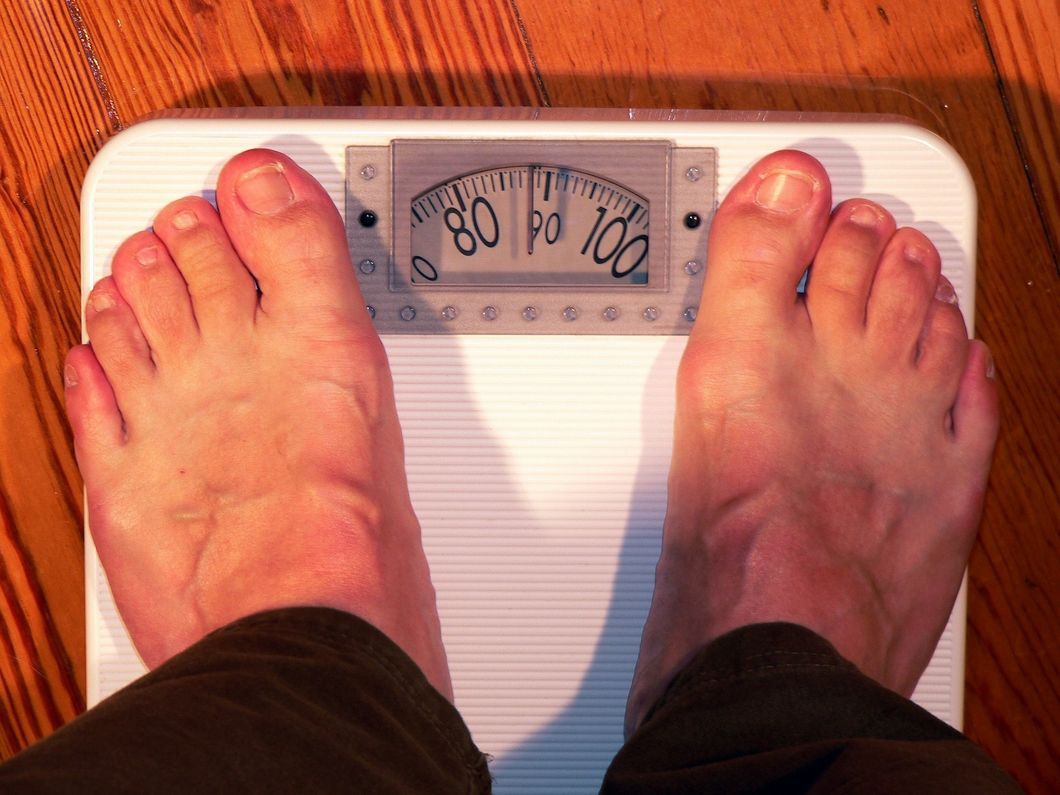The fad is not new, and you've probably seen it— videos of women of all shapes and sizes taking a sledgehammer to a scale.
These media feminists— either Buzzfeed employees or social media influencers— frame household, bathroom scales as abusers; a cause for their body-image related anxiety.
Personally, I think these people are projecting their insecurities.
I get the pain these individuals must feel. They suffer through dressing-less salads and walk up a treadmill's incline short of breath for an hour. When they weigh themselves after all that hard work— all that getting out of their comfort zone and time spent around people who could potentially harass them for the thing they are so desperately trying to change— the scale reads that they gained a pound or two the next morning.
The shock, shame, and confusion that follows— that voice in the back of their head that they've been beating off with barbell-sized effort is suddenly so close it's screaming in their ear— is far heavier than the highest weight they've carried on their stomach. In this situation, I'm certainly not surprised or critical of the subsequent demonizing of "the scale;" but it's not "the scale's" fault.
"The scale" is not a critic saying "you're not good enough" after watching you choke down a salad instead of a burger at lunch.
You are.
You are your own bully.
I understand that after all that self-loathing, after seeing one's weight go up on a scale and wanting a breather from this self-hatred, these people crave a scapegoat. Someone, or in this case, something else has to take the blame.
The scale in the bathroom.
It has made those who struggle with weight loss so upset, in fact, that they want to break it and record that breaking. In these "smashing the scale" videos, you can see the anger on their faces and subsequent relief wash over them when it's over. Some of these videos have a speech, in the beginning, talking to the scale like its a criminal and recounting all the ways it has hurt women. In others, the smasher will give an anecdote about their own bad experiences with "the scale" in the past.
The moniker "the scale" in itself personifies this tool, this household object— even their language an indicator to the supposed power they gave this tool.
I'm willing to bet that even after the scale is broken and their dreams of weight loss are tossed aside in that desperate effort to feel self-love again, that self-hating voice inside them is still screaming behind that triumphant smile.
Or maybe the self-shame looms, waiting for one of those vulnerable moments when they catch an unprepared glimpse of themselves in reflective glass.
Maybe that voice is constantly, exhaustively fought off with the sledgehammer they smashed "the scale" with.
Whatever the case, it's easy to assume that breaking a scale didn't solve any of their problems. It's a shame, too, because, with enough self-love, education, and mindfulness, they probably would've reached their goal. Loving themselves despite what the scale says or what pant size you are is a better step than smashing it.
In fact, in the hypothetical instance, I described at the beginning (where a person does "all the right things," yet gains weight), it'd be very possible that they had, in fact, lost a bit of weight and gained muscle, which is significantly heavier than fat.
For instance, I find that when I start eating better and exercising, I appear to either stagnate or gain less than a pound for a week or two before my number on the scale even lowers. I'm more familiar with the weight-loss process though, so it doesn't scare me as much as I'd imagine it would shock other people. Instead, I look to how I physically feel rather than weight or clothing size— measurements which result from a number of factors, not just fat.
Perhaps, instead of "smashing the scale," understanding your scale should be the new fad. Although not as exciting, I feel it's important for those who suffer from eating disorders to learn about the thing they fear— their weight— rather than attack it. Acquiring this understanding of one's own weight is especially important since destroying one's personal scale does not omit one from being weighed at a doctor's office when taking vitals, for instance.
Remember, "smashing the scale" does not remove the fear or power the scale holds over individuals, but rather makes that power more real in acknowledging it in this public, passionate way. It's seen as an enemy, and anything that is routinely used in a doctor's office should not be given this much emotional power over someone since it very likely will result in negative check-up experiences or none at all.
All in all, education, rather than aggression, should be the focus of those either struggling with an eating disorder or those who want to be allies to them. Only in this way would these individuals overcome their anxieties overweight.
















